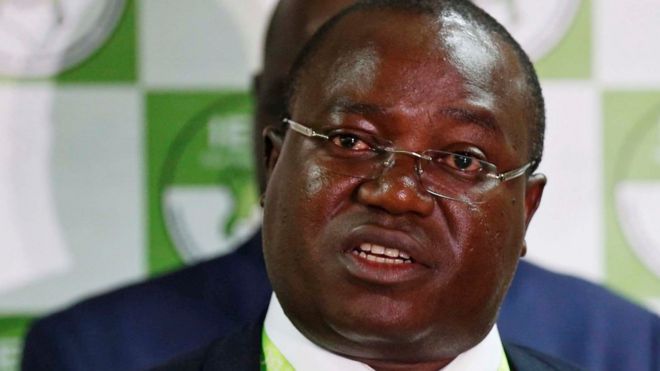By BARACK ODUOR
More by this Author Benga musician Tom Mboya Ang’ang’a (Atomy Sifa). He fled to Tanzania after claiming that his life was in danger. PHOTO | COURTESY
Benga musician Tom Mboya Ang’ang’a (Atomy Sifa). He fled to Tanzania after claiming that his life was in danger. PHOTO | COURTESY
When Luo Benga artist Tom Mboya Ang’ang’a, best known as Atomy Sifa, produced a song in praise of President Uhuru Kenyatta together with little-known musician Tede ja Kenya, little did he know that the contents of the song would see him exiled.
Mr Sifa, who fled to Tanzania a week ago after he claimed his life was in danger, told the Nation he relocated following threats to his life.
“People called me, threatening that they will kill me for insulting Raila Odinga in the song,” said Mr Sifa.
The song, titled Uhuru Nyale (Uhuru is Capable), blames Mr Odinga for ills bedevilling the Luo community.
Sifa and Tede in the song “advise” members of the Luo community to stop paying allegiance to Mr Odinga and support President Kenyatta’s re-election.
The song also accuses Mr Odinga of not initiating meaningful development during his tenure as Prime Minister.
In one of the stanzas he sings, “Joluo ugaloru mojoga ubiro luwo ng’ani nyaka kar ang’o (Luos, you shouldn’t be wasted. Until when will you follow this person)?”
Sifa received condemnation from Mr Odinga’s supporters who accused him of being used to undermine the Nasa leader.
Sifa on Saturday denied composing the song, saying he was passing next to where Tede was producing the video and he was asked to join because of his popularity.
“I never knew what the song was all about. I was invited to be part of the video but later realised it was disparaging Mr Odinga,” said Mr Sifa.
He argues that he has been composing songs for Mr Odinga and there is no way he would compose another one disparaging him.
“You know that I have composed more than four songs for Mr Odinga and I cannot compose a song calling him names,” claimed Mr Sifa.
His fellow musicians and Nasa supporters believe he was being used by Jubilee Party’s sympathisers in Nyanza.
Small Otieno, a fellow benga artiste, distanced himself from Mr Sifa’s song.
“We have disowned Mr Sifa for composing song which is shameful at a time the region’s political kingpin seeks the highest office in the land,” said Mr Otieno.
Mr Sifa’s home in Adiedo Karachuonyo in Homa Bay County is deserted. His relatives who spoke to the Nation differed over his predicament.
Ms Jael Achieng’, a close relative of the musician, said Mr Sifa has liberty to sing whatever he wants.
“He has been praising Mr Odinga in his songs for years and he has got nothing to show for it. What is wrong when he praises President Uhuru?” asked Ms Achieng’.
Mr Joackim Mboya, another relative, said that Mr Sifa is an orphan who has been struggling to earn a living.
He noted that the artiste missed the point when he disparaged Mr Odinga.
“It was wrong for Mr Sifa to make Mr Odinga and the whole Luo nation a laughing stock in his new composition,” argued Mr Mboya.
It is alleged that top a Jubilee Party bloggers and officials in Nyanza approached four Luo musicians including Mr Sifa to compose for them songs praising Mr Kenyatta but they failed to agree on payment. But Mr Sifa made a deal with them.
A source privy to the happenings behind the production of the song told the Nation that the musician was approached by people from the National Intelligence Service (NIS) who called him from his house for a meeting in Nairobi.
The source said that the people pushing for the song first approached two other popular Ohangla musicians with the same deal during the first meeting at Choma Zone Hotel along Thika Road but they failed to agree on the monetary terms as the two were quoting higher cash than the agents were willing to pay.
After the botched first meeting in which Atomy Sifa was also present, another meeting was organised with Mr Sifa and it is during this meeting that a deal was struck.
The musician who was reportedly facing financially lean times at the time quoted a very low sum, way below what other musicians had quoted, which the agents promptly agreed to.
A contract was then handed over to the musician to sign before he was given the cash.
The musician, our source said, was given already written lyrics and was told that he was to sing them without changing anything in the lyrics.
A video for the song was also made and was uploaded on YouTube by the agents.
The song soon gained many views and news about the video started spreading like wildfire.
Jubilee’ Homa Bay county governorship candidate Tom Alila has asked police to ensure Mr Sifa is safe.
“Police have the duty to protect Mr Sifa and his relatives because we cannot withstand those violating other people’s right of expression,” he said.
Mr Alila asked why the musician was still poor after praising Mr Odinga for years yet Luos are now mad at him when he composes just a single song for President Kenyatta.
“Why couldn’t the many songs he sang for Mr Odinga uplift him economically?” asked Mr Alila.
- Additional reporting by Collins Omulo










